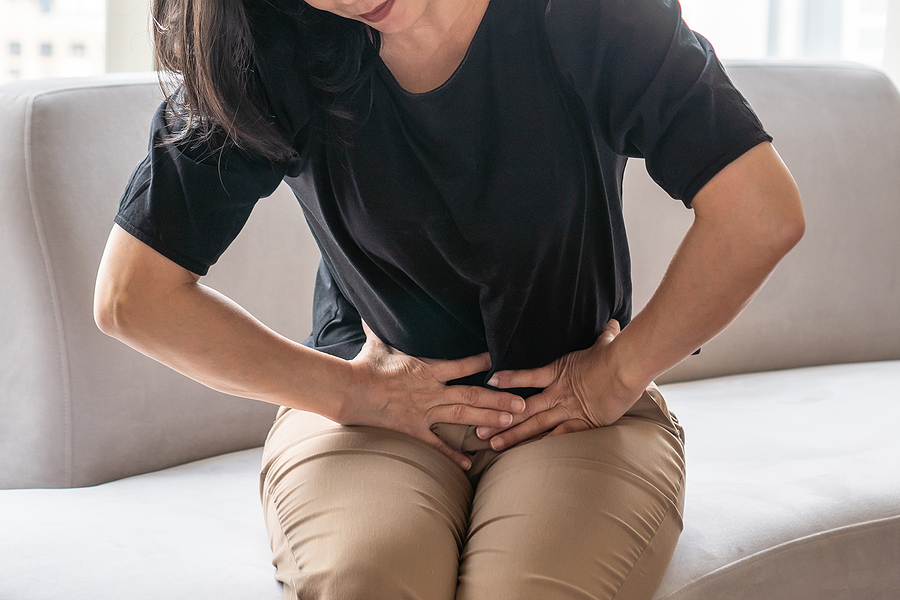Updated 02/12/2023
When Caitlin came to see me, she was frustrated. Almost every day she dealt with bloating, pain and cramping in her abdominal region, and gas. She never knew if she would wake up with diarrhea or be completely unable to have a bowel movement.
“It’s not just the pain,” she told me, “it’s the rollercoaster.”
She described how on certain days, she actually felt fine– but that made waking up the next day with painful constipation almost more upsetting.
Caitlin had spoken with her physician several times about these uncomfortable symptoms, and the way they seemed to be ruling her life.
They’d done a number of tests to rule out serious health conditions, and when they came up empty, he had finally diagnosed her with Irritable Bowel Syndrome (IBS).
But what did that really mean? He offered her a few medication options to manage the symptoms, but no real guidance on what the underlying root cause might be. He seemed to be telling her she just had to learn to live with it.
Caitlin isn’t the first client to come to me because the only solutions they’ve been offered are to take medications and learn to manage their symptoms. But that simply wasn’t good enough for her. She knew there had to be something behind the problem, and she wasn’t willing to endure these symptoms for the rest of her life. And she shouldn’t have to!
I asked Caitlin a lot of questions that she hadn’t been asked before, including about her stress levels– and whether she’d had her hormone levels tested recently. That’s because I know that there’s an important (and often overlooked) connection between hormonal balance and symptoms of IBS.
Let’s take a closer look at this, and then I’ll offer some guidance on how to balance your hormones to ease the symptoms of IBS.
What is IBS?
Irritable Bowel Syndrome is a common health issue, impacting approximately 15% of all Americans. Women are twice as likely as men to be diagnosed with IBS.
Common symptoms of IBS are exactly what Caitlin was experiencing: belly pain, cramping, gas, bloating, and changes in her stool.
There are three types of IBS. With the first, you may have frequent loose stools, an urgent need to move the bowels, and frequent cramps/pain. With the second, you may be constipated, you may have infrequent bowel movements, and you may feel the urge to go but be unable to do so.
The third type, which Caitlin was diagnosed with, is a combination of both of the others– alternating between diarrhea and constipation.
Increasingly, we’re also learning that IBS may lead to other, non-digestive symptoms. Research has shown that anxiety and depression are significantly more common in those with IBS than in those without, and many people with IBS also experience symptoms like fatigue.
Even though IBS does not necessarily cause lasting harm to body systems on its own, it can take quite a toll on physical and emotional health, as well as on your social life. That’s why it’s important to talk to a healthcare professional if these symptoms linger for several weeks or months.
What causes IBS?
Irritable Bowel Syndrome is a diagnosis of exclusion. That means that there isn’t a specific test that will confirm that you have IBS. Instead, testing, such as blood tests, stool tests, colonoscopy or endoscopy will rule out other conditions like infection or more serious disease. When no other conditions are found, your doctor may determine that you have IBS.
There is no single, identifiable cause of IBS. In fact, it’s probably a combination of factors that impacts how your GI tract is functioning. These might include abnormal muscle contraction in the GI tract, hypersensitive nerves attached to the GI tract, and problems in the communication between the brain and the gut.
The relationship between hormonal balance and digestive function is another essential one to consider– and one I wish more practitioners would dig into. Let’s explore these connections now.
How Do Hormones Impact IBS Symptoms?
As I said before, women are twice as likely as men to get IBS. And often, women experience flare-ups of IBS during their menstrual cycles.
Let’s take a closer look at many different types of hormones and how they may impact IBS.
Sex hormones
Research shows that there is a connection between symptoms of IBS, and the balance of estrogen and progesterone. In a review of literature in 2009, authors concluded that GI symptoms that increase around the time of menses and early menopause happened when ovarian hormones were low or declining, suggesting that lower levels of estrogen or progesterone can impact symptoms of IBS.
A 2014 article in the World Journal of Gastroenterology, authors concluded that clinical and experimental data strongly supports the idea that sex hormones play a key role in the regulatory mechanisms of the brain-gut-microbiota axis involved in IBS.
They also reported that sudden changes in estrogens, as well as complex interactions with other neurotransmitters, had more of an impact on visceral sensitivity than just the levels alone. Authors also concluded that growing evidence suggests that androgens play a protective role in modulating pain, and testosterone has anti-inflammatory properties that could inhibit development of visceral hyperalgesia. This could explain why women are more susceptible to IBS than men.
Imbalanced sex hormones can change the way your food moves through your digestive system as well. One animal study found that a lower dose of hormones increased the time it took to empty the contents of their stomachs when compared with a higher dose. This could help to explain the constipation that many women with IBS experience.
When estrogen decreases, pain can become more intense because estrogen raises production of serotonin, a chemical in your brain associated with feeling good. That means that a higher level of estrogen may reduce the pain you feel. Imbalanced sex hormones also contribute to inflammation, which often makes symptoms worse.
More research is needed to really understand the way sex hormones and IBS are connected, but there is enough evidence available to indicate that balancing these hormones can decrease the associated symptoms to some extent.
Stress hormones
Stress is connected to almost any health condition in one way or another. We’ve learned so much about the impact of chronic stress on our bodies, and it’s clear that stress reduction is one of the most important steps we can take towards better health.
Anxiety, depression, and increased stress are all known risk factors for developing IBS. And this stress doesn’t even have to be current! Some studies have shown that childhood abuse or stressors from many years prior also predispose people to developing IBS later in life.
IBS patients report significantly more negative events in their lives than other patients with stress-induced conditions, like peptic ulcers. In two-thirds of IBS patients, mental illness episodes or situations or anxious situations exacerbate symptoms.
In one study, individuals with IBS showed higher cortisol/DHEA ratio upon awakening than those without IBS and the elevated ratio peaked under prolonged stress. Authors concluded that the study suggested that the “cortisol effect” is dominant in individuals with IBS under prolonged stress.
Cortisol levels also have an impact on other hormones, as they are all interconnected. You can read more about this connection in my articles on adrenal health in my health library.
Gut hormones
Gut peptides contribute to proper regulation of gastrointestinal functioning, but there’s a lot unknown about how gut hormones are secreted in patients with IBS. A study in 2008 evaluated concentrations of several peptides in 40 patients with IBS and 15 control patients. The study found that levels of some were higher in patients with IBS, while others were significantly lower. The changes in these peptides could play a role in the manifestation of IBS.
The gut-brain connection – similarities in the nervous systems of the brain and the gut – is well established. The gut manufactures 95% of the serotonin in our bodies. The main role of serotonin in the gut is to stimulate movement and contraction of the intestines. Foods that cause a serotonin spike (often refined carbs) may also trigger an IBS episode.
The relationship between the gut and the brain is complex, but worth considering when thinking about IBS.
Balancing hormones to heal IBS
With the hormonal connections that exist, it makes sense that keeping all of the essential hormones in your body balanced can help reduce symptoms of IBS. Drug treatments simply mask symptoms, so while they might make you feel better temporarily, they’ll do nothing to prevent symptoms from returning. Healing the underlying causes will go much further in improving your quality of life. Below are some tips for creating natural balance and healing.
Eating for hormonal balance and relief
One of the best ways to keep hormones well balanced and uncomfortable symptoms at bay is to make your diet as balanced and nutritious as possible. That means avoiding processed foods, excess caffeine, alcohol, sugar, and trans fats as often as possible.
A healthy diet is not a boring diet though. Fresh organic produce is delicious and filled with all the nutrients your body needs. Eating a wide variety of fruits and vegetables is important; that’s why I always tell clients to “eat the rainbow.”
Lean protein, healthy fats, and fiber are also important components of a healthy diet.
Because IBS symptoms often crop up after meals, you should pay close attention to what you are eating that triggers these symptoms. Try keeping a food journal for a week before changing your diet, so you can identify any hidden food sensitivities.
Finally, don’t forget to stay well hydrated. Water, herbal tea (both hot and cold), and seltzer are all good choices. Try to avoid caffeinated beverages and sugary drinks as often as possible.
Managing stress for balanced hormones
Stress has a huge impact on hormonal balance, so it’s essential to find ways to reduce stressors and relax, especially if you’re experiencing uncomfortable symptoms. There are multiple factors that will help reduce stress levels, and each one is important.
It’s always important to address emotional issues – especially those that have lingered for a long time. Mindfulness practice and learning to be present in each moment can help you let go of old hurts.
Spending time outside is a great way to relieve stress. Even a quick walk around the block can give you a new perspective. Self-care is non-negotiable if you want to feel your best. Whatever your needs are, it’s critical that you know them, and tend to them with the same attention you give to everyone else.
Finding an activity that you love, that allows you to forget everything else while you’re doing it, can work wonders. For me, that’s dancing, but it’s different for everyone. It isn’t what you do that matters – it’s the joy you feel while doing it that will make a difference.
Take time to breathe deliberately. There are many methods you can try, and apps that will walk you through breathing techniques. Learning to breathe deeply and fully will calm your nervous system and let stress slip away.
Exercise to achieve better balance
Keeping your body moving will help keep all your body systems functioning well, but there’s no need to overdo it. Trying to squeeze hours of exercise into an already crowded life just causes more stress. But giving yourself five or ten minutes to stretch when you wake up, or twenty minutes for a brisk walk around the neighborhood can make a big difference for hormonal balance.
Try natural supplements to balance hormones and relieve symptoms
Because it’s tricky to get all the nutrients you need no matter how healthy you are eating, I always recommend a high-quality daily multivitamin. I also think that a probiotic can aid everyone in maintaining good balance in the gut. Other targeted supplements can be helpful depending on your own unique situation – it’s best to work with a functional medicine practitioner to devise a plan that will work for you.
IBS can be limiting, especially when you are fearful that you’ll need a bathroom more quickly than you can reach one. Taking steps to address the underlying hormonal imbalances can help you get back to all the activities you once enjoyed.
Don’t let IBS rule your life – you have more control than you think! Remember Caitlin? When she spent some time working on hormonal balance, her symptoms subsided – and they haven’t returned! That’s because she now understands how much her lifestyle choices impact her health. Now, she doesn’t have to hold back. She’s back to all the activities she used to love, including long hikes in the woods. You can take your life back as well!
Resources:
https://www.mind-body-health.net/ibs.shtml
https://www.news-medical.net/health/Irritable-Bowel-Syndrome-(IBS)-and-Stress-Response.aspx
https://www.webmd.com/ibs/guide/hormones-ibs#1
https://gastro.org/practice-guidance/gi-patient-center/topic/irritable-bowel-syndrome-ibs/









